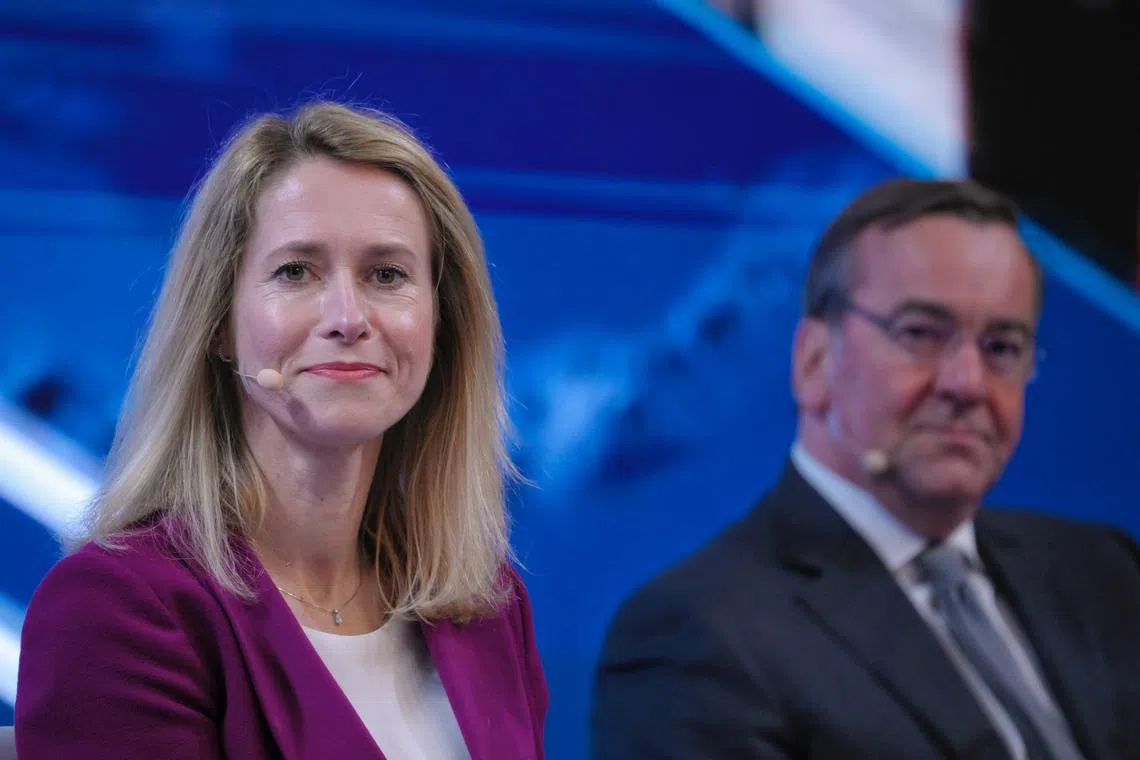Shangri-La Dialogue
Blaming Nato for Ukraine war denies smaller states’ sovereignty over defence: Estonian PM
Sign up now: Get ST's newsletters delivered to your inbox

Estonian Prime Minister Kaja Kallas (left) and German Defence Minister Boris Pistorius at the IISS Shangri-La Dialogue on June 4.
ST PHOTO: MARK CHEONG
SINGAPORE - It is a myth that Russia’s “war of choice” against Ukraine was caused by the expansion of the North Atlantic Treaty Organisation (Nato), said Estonian Prime Minister Kaja Kallas.
The military alliance does not exist to threaten Russia but to defend Nato’s 31 members from it, she said at the Shangri-La Dialogue on Sunday, adding that Finland and Sweden’s “complete turnaround” in their defence policies was the most recent example of this.
Those who accuse Nato of expansionism and escalation are adopting the same imperialistic language and ideology promoted by the Kremlin, said Ms Kallas at the security forum of top defence officials and academics in Singapore.
“This viewpoint disregards the right of smaller countries to make their own choices about their foreign policy and defence arrangements. It denies their independence and sovereignty,” she said.
Living next to an “aggressor” left Estonia and several other countries no option but to apply for Nato’s security guarantee, she said, wading into a debate on who shares the blame for the war in Ukraine that broke out in February 2022.
Ms Kallas said: “We would be living through some really dark times right now if we were not in Nato and the European Union. So it is multilateralism and strong alliances that are yet another stronghold of defence, especially for small states.”
Estonia gained independence in 1991 when the Soviet Union was dissolved, and joined Nato with other Baltic states in 2004. Finland and Sweden formally applied to join Nato in May 2022, Russia’s invasion of Ukraine.
The Prime Minister was speaking at an hour-long session alongside Timor-Leste President Jose Ramos-Horta and German Defence Minister Boris Pistorius at the Shangri-La Hotel on the last day of the forum.
In a question to Ms Kallas, China’s Senior Colonel Zhao Xiaozhuo contended that Nato, while providing security guarantees to its members, also views other countries as threats, causing “division and confrontation”.
Ms Kallas replied that a military alliance need not have an enemy, and reiterated that membership was an existential issue for Estonia, which has a population of 1.3 million. “We had to work very hard to get there (into Nato). And if we weren’t in Nato, we would be living through some really dark times right now. But we are, and that is why we are free and independent.”
In his speech, Mr Pistorius outlined Germany’s shifting defence policy particularly in the light of the Ukraine war, while Mr Ramos-Horta called for greater aid to developing countries.
Mr Pistorius said that given the severe negative consequences of any major tensions or even armed conflict in the region, his country is ready to strengthen its engagement in the Indo-Pacific in the years ahead.
To protect sea lines of communication, Germany will deploy a frigate and a supply ship to the region in 2024, following a deployment of a frigate in 2021, he said in his speech.
“These deployments, I want to make that very clear, are not directed against any nation. To the contrary, they are dedicated to the protection of the rules-based international order that we all signed up to, and which we all should benefit from,” he said.
Quizzed about his country’s ongoing efforts to become a full member of Asean, Mr Ramos-Horta said Timor-Leste has made tremendous progress since gaining independence in 2002.
Then, Timor-Leste had 19 medical doctors, compared with 1,200 today, he said. There was only one university in 2002 but this has grown to 16 universities and institutes of higher learning today.
Timor-Leste was admitted in principle as the 11th member of Asean in November 2022, and is in the process of meeting the requirements needed for full membership, such as financial resources and infrastructure facilities.
“Our best contribution to Asean is we should not be a burden and a headache for Asean. So we keep the peace in our own country. We develop as much as we can,” he said.


